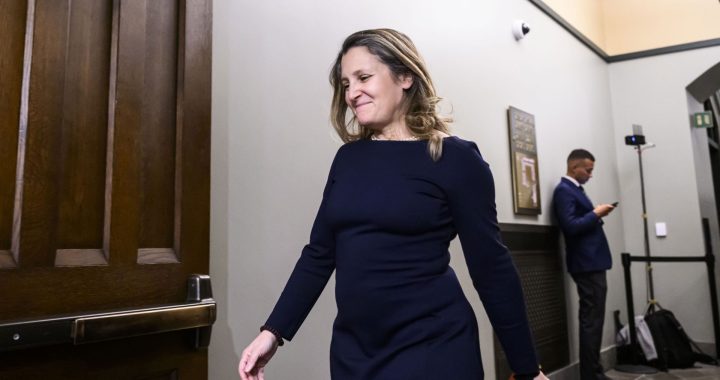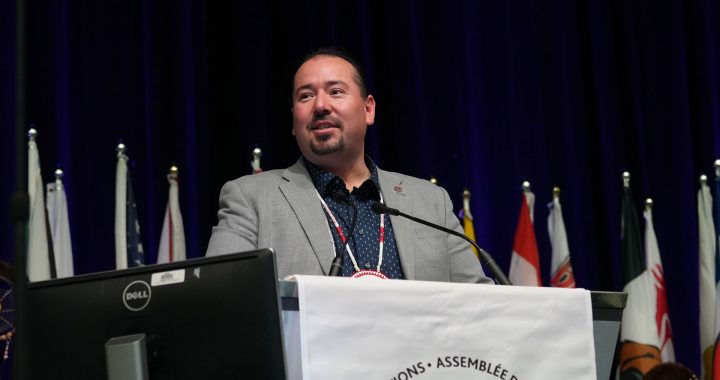
The MAID law legalized assisted death for Canadians 18 and older with terminal illnesses in 2016. It was expanded in 2021 to include those with serious and chronic physical conditions, even if that condition was non-life threatening. Photo: APTN file
The Canadian government and class-action lawyers have reached a final settlement agreement that, if approved, would see $20 billion paid out to victims of the country’s purposefully underfunded First Nations child-welfare system.
Thousands of now-adult First Nations children who suffered delays and denials when trying to access health care or essential social services that ought to have been available under Jordan’s Principle are also eligible for compensation.
The federal Liberals, the Assembly of First Nations (AFN) and counsel representing lead plaintiffs Xavier Moushoom and Zach Trout announced the development in a press release on Monday afternoon.
The release says the parties spent the last six months working “collaboratively and tirelessly” to finalize the deal, which was announced in draft at the end of December 2021.
The following groups will be eligible for inclusion in the settlement, according to the release:
- Children who were removed from their homes under the First Nations Child and Family Services program between April 1, 1991 and March 31, 2022
- Children who were impacted by the government’s narrow definition of Jordan’s Principle between December 12, 2007 and November 2, 2017
- Children who did not receive or were delayed in receiving an essential public service or product between April 1, 1991 and December 11, 2007
- Caregiving parents or caregiving grandparents of the children above may also be eligible for compensation
The $20-billion compensation agreement forms half of the overall settlement.
The Liberals also pledged another $20 billion for long-term reform of the First Nations child and family services program.
The press release says the parties “are working hard” at reaching a final agreement in that case.
Both agreements require approval from the Federal Court and the Canadian Human Rights Tribunal to be implemented.
The AFN and the First Nations Child and Family Caring Society filed the original complaint with the tribunal now more than 15 years ago, and litigation has continued non-stop since then.
The AFN issued a statement reacting to the deal on Monday as well.
“We’ve held our children in our hearts and prayers throughout negotiations, reaching an agreement that we believe fairly upholds the 2019 orders of the Canadian Human Rights Tribunal and broadens the scope of First Nations children and families eligible to seek compensation where they experienced discrimination in the federal First Nations Child and Family Services program and the narrow implementation of Jordan’s Principle,” said Cindy Woodhouse, AFN regional chief for Manitoba, in the release.
“The next steps are procedural and pending court approvals, we expect compensation will begin to reach First Nations next year.”
Child advocate and caring society executive director Cindy Blackstock reacted to the news via tweet.
“We are just learning about the agreement on compensation between class action counsel and Canada,” she said. “We will review to ensure that children and families entitled to 40K per the tribunal orders get that amount as a minimum and the supports they are entitled to.”
We are just learning about the agreement on compensation between class action counsel and Canada. We will review to ensure that children and families entitled to 40K per the tribunal orders get that amount as a minimum and the supports they are entitled to. 1/3
— Cindy Blackstock (@cblackst) July 4, 2022
In 2019, the tribunal ordered Canada to pay $40,000, the maximum allowable amount under the Canadian Human Rights Act, as compensation to each victim of its discriminatory funding practices, an order the federal government challenged in court — and lost.
The tribunal ruling, however, only covered victims dating back to 2007, while the discriminatory funding policy came into force in 1991, meaning many victims wouldn’t be covered by the tribunal’s compensation order.
Despite losing a judicial review in Federal Court, the government took its fight one level higher by filing a challenge to the decision in the Federal Court of Appeal.
The government promised to try and settle before litigating, but the appeal technically remains on the books.
Blackstock said the caring society believes Ottawa should immediately drop this appeal and pay the $40,000 human rights compensation to each victim.
“The Caring Society is not a party to the compensation final agreement nor are we seeking any benefit related to the compensation,” she added. “We simply want to ensure the rights of victims to the human rights damages are respected.”










